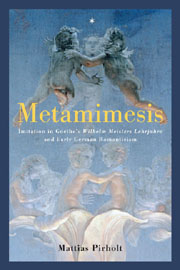Book contents
- Frontmatter
- Contents
- Acknowledgments
- List of Abbreviations
- Introduction
- 1 Romanticism, Mimesis, and the Novel
- 2 Double-Entry Imagery: Johann Wolfgang Goethe's Wilhelm Meisters Lehrjahre
- 3 Imitation and Indolence: Friedrich Schlegel's Lucinde
- 4 Imitation and Simulation: Novalis's Heinrich von Ofterdingen
- 5 Beyond Romantic Representation: Clemens Brentano's Godwi
- Conclusions: Mimesis and the Critical Politics of Romanticism
- Bibliography
- Index
Conclusions: Mimesis and the Critical Politics of Romanticism
Published online by Cambridge University Press: 05 February 2013
- Frontmatter
- Contents
- Acknowledgments
- List of Abbreviations
- Introduction
- 1 Romanticism, Mimesis, and the Novel
- 2 Double-Entry Imagery: Johann Wolfgang Goethe's Wilhelm Meisters Lehrjahre
- 3 Imitation and Indolence: Friedrich Schlegel's Lucinde
- 4 Imitation and Simulation: Novalis's Heinrich von Ofterdingen
- 5 Beyond Romantic Representation: Clemens Brentano's Godwi
- Conclusions: Mimesis and the Critical Politics of Romanticism
- Bibliography
- Index
Summary
Die unerschütterliche Notwendigkeit der Gesetze der Natur, und die unvertilgbare Vervollkommnungsfähigkeit des Menschen: die beiden Pole der höhern politischen Kritik! (KA II, 87)
From the very beginning, the political implications of romantic aesthetics and philosophy have been under debate. The radicalism that epitomizes Madame de Staël's interpretation in De l'Allemagne (1810) — she construes German literature in general and romanticism in particular to be closely connected with the formation of the modern political institutions — was soon replaced by an equally radical conservative conception, often combined with an explicitly derogatory attitude. The latter view dominated the better part of the nineteenth century, expressed most eloquently in Heinrich Heine's Die romantische Schule (1833) and in Theodor Echtermeyer and Arnold Ruge's Der Protestantismus und die Romantik (1839), and it still permeates Georg Lukács's works on literature of the 1940s and 1950s. A decade or so later, however, we encounter a fundamental turn to the left, and in texts by many Marxist scholars, Werner Krauss and Hans Mayer among others, the political radicalism of the romantics and the connection between the young generation in Germany and the French Revolution are repeatedly underscored. And the debate continues today. Whereas a literary scholar like Hermann Kurzke argues that romanticism, though apolitical by nature, sided with the political restoration, a philosopher like Frederick C. Beiser maintains that the romantic generation continued and radicalized the politically progressive implications of the Enlightenment.
- Type
- Chapter
- Information
- MetamimesisImitation in Goethe's 'Wilhelm Meisters Lehrjahre' and Early German Romanticism, pp. 189 - 194Publisher: Boydell & BrewerPrint publication year: 2012



